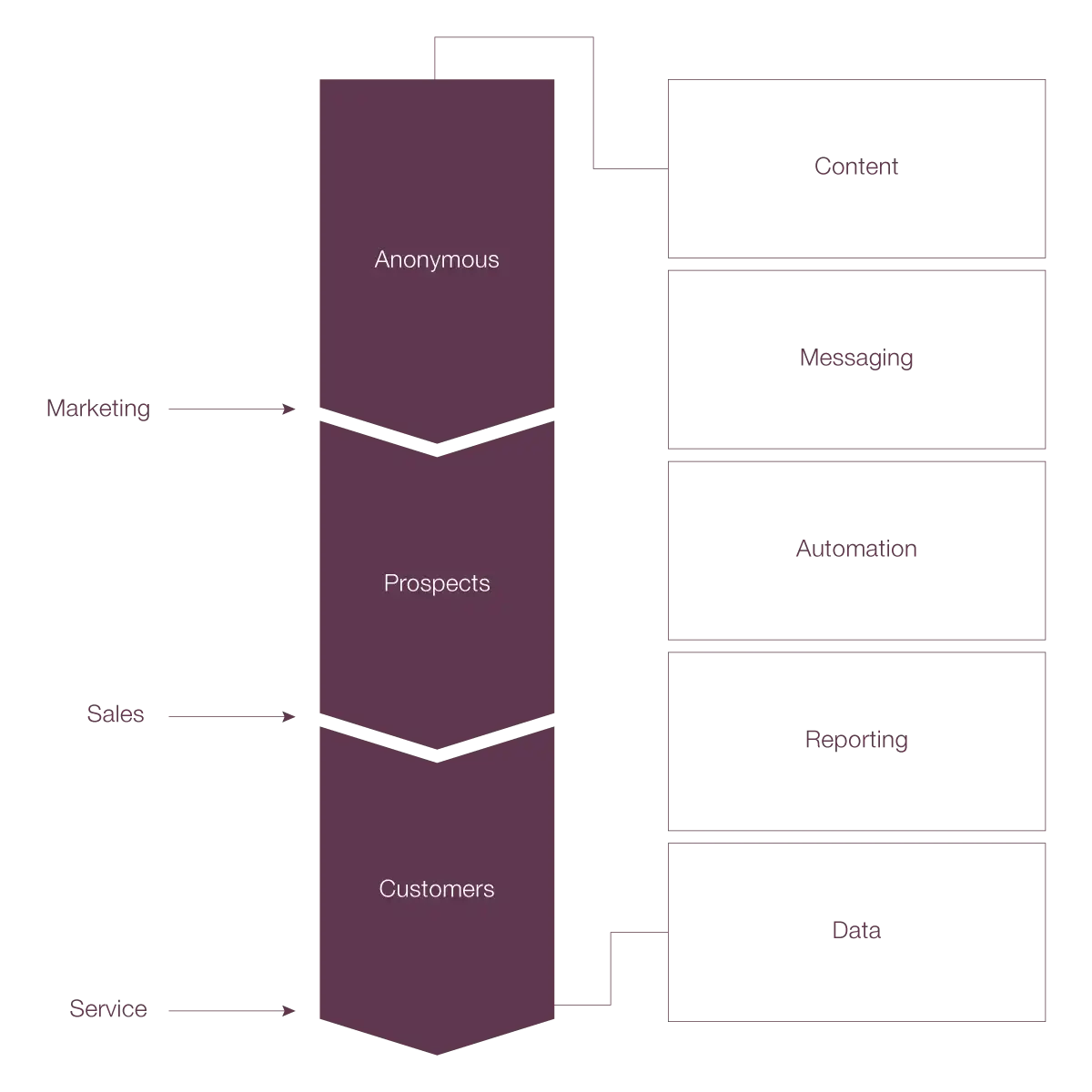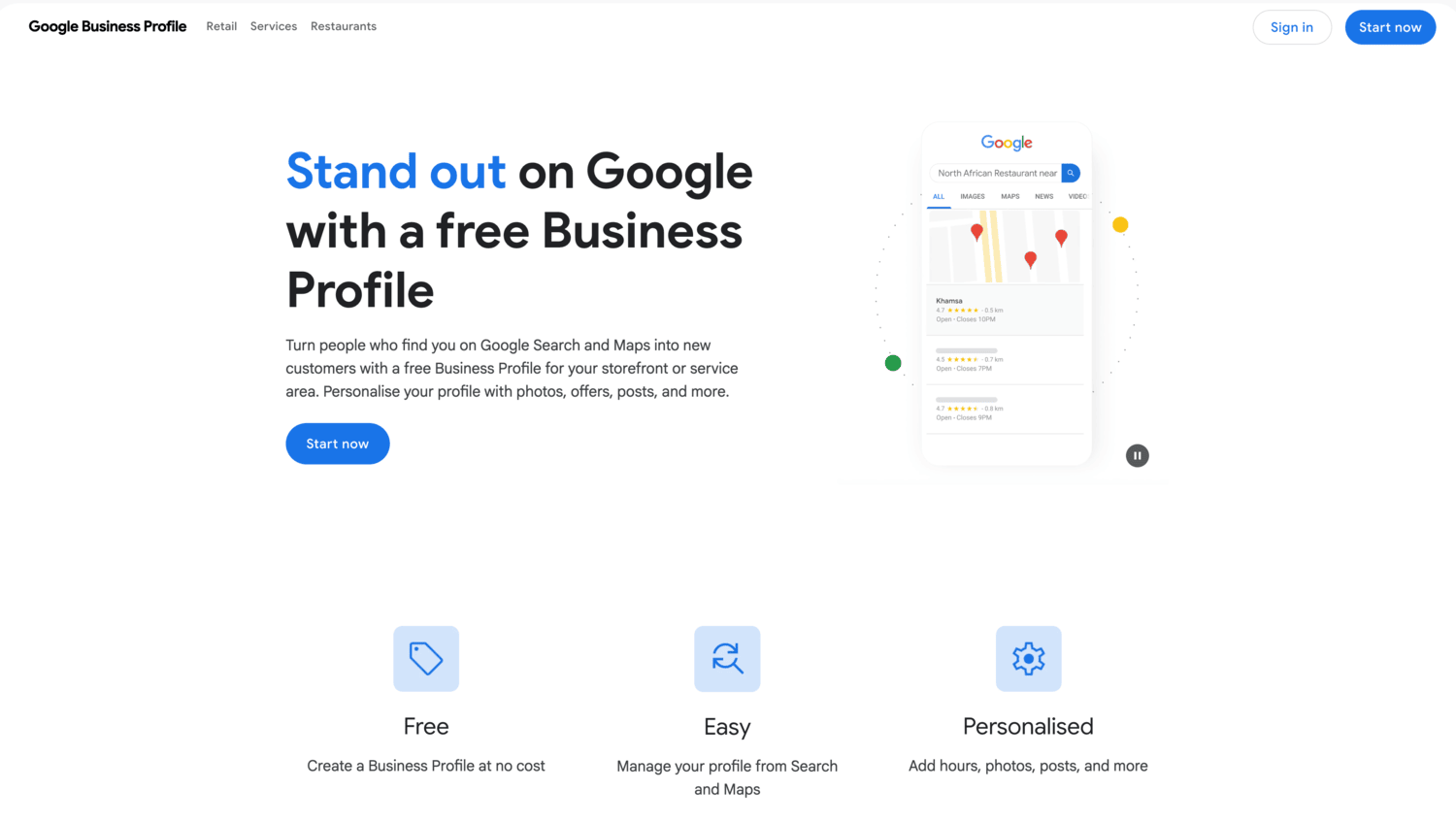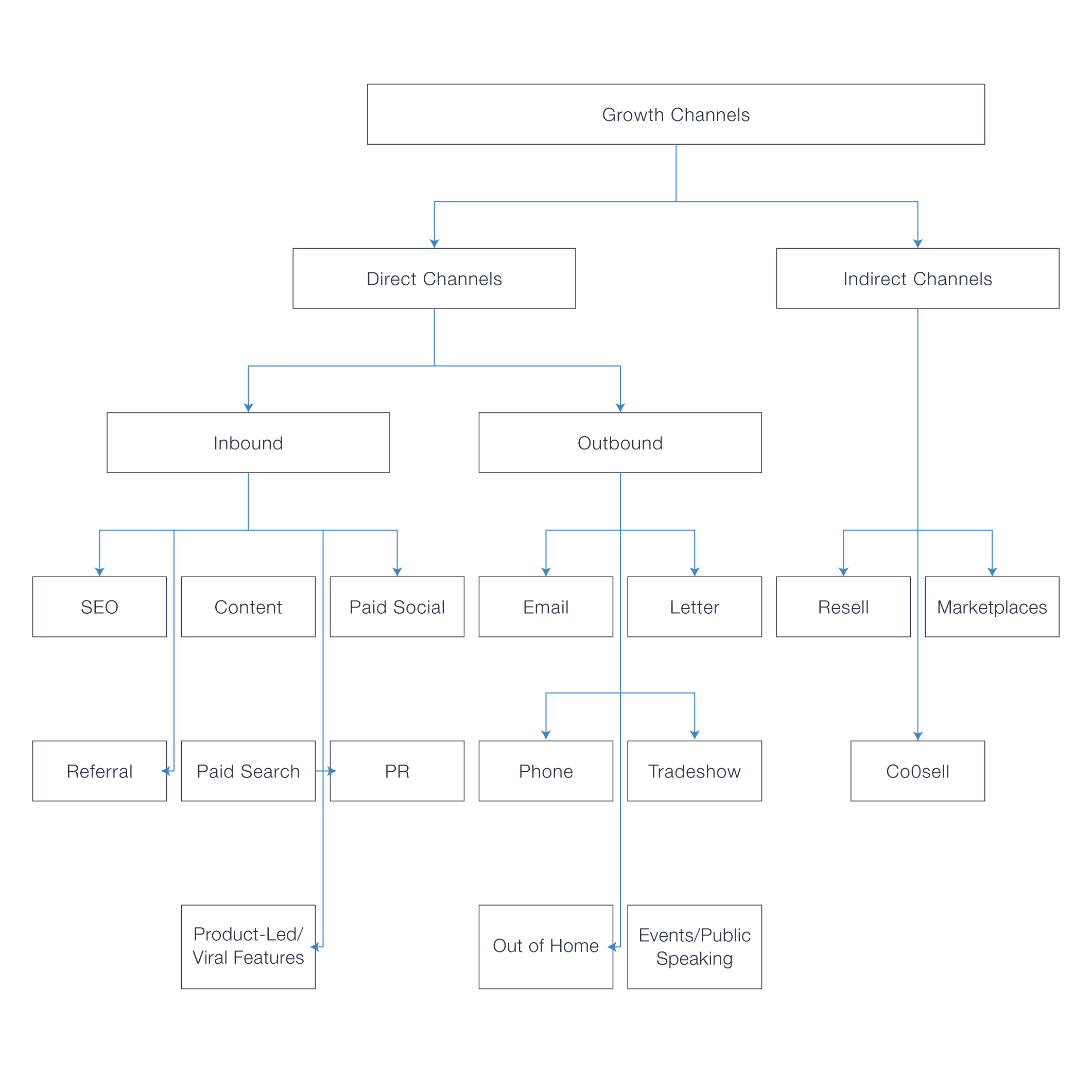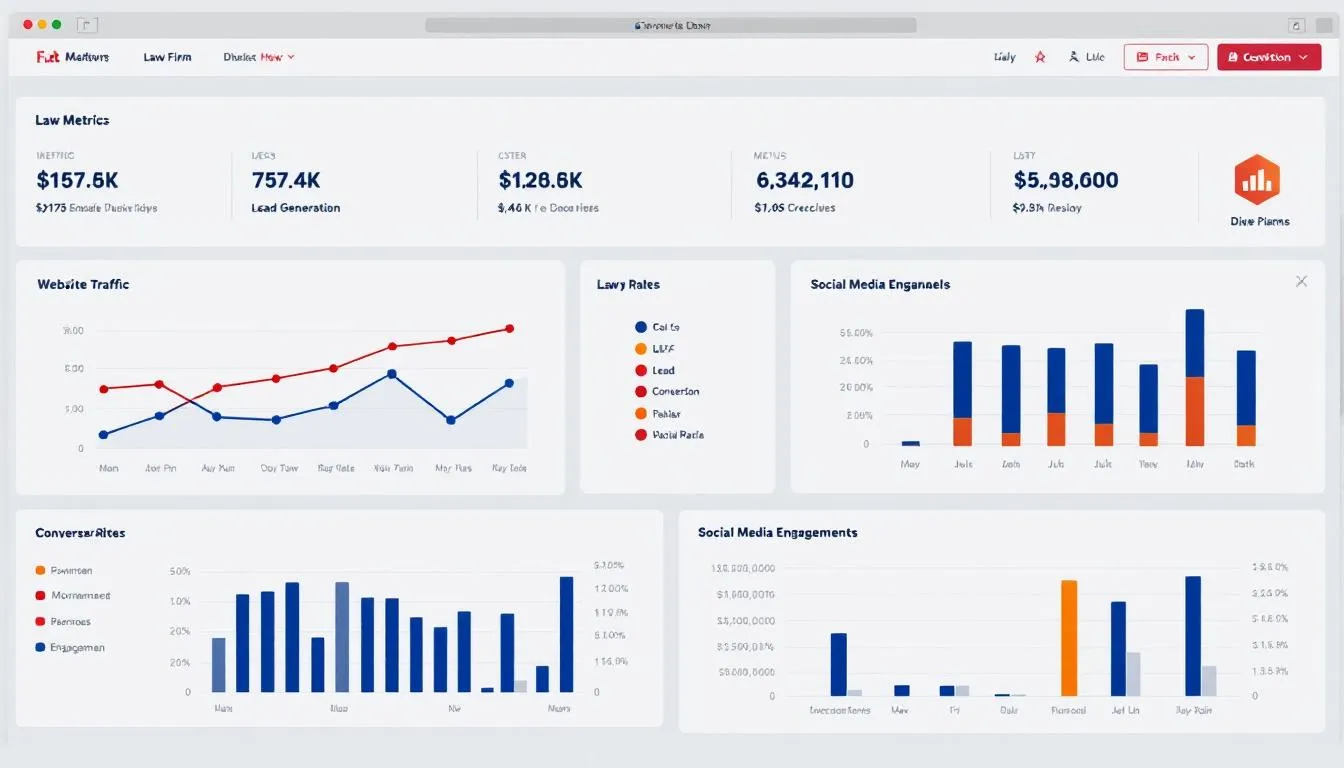Share this
Law Firm Marketing: Complete Guide to Growing Your Legal Practice in 2026

In today’s competitive legal landscape, even the most skilled attorneys struggle to attract new clients without effective marketing of their law firm's services. With over 1.3 million practicing attorneys in the United States and 96% of people searching online for legal services, your legal expertise alone isn’t enough to guarantee success. The firms that thrive are those that master the art of connecting with potential clients through strategic marketing efforts.
Law firm marketing has evolved dramatically from the traditional referral-based model that once dominated the legal industry. Today’s successful law firms embrace both digital marketing strategies and time-tested traditional methods to build their law firm’s brand and attract prospective clients. Whether you’re a small law firm just starting out or an established practice looking to expand, this comprehensive guide will provide you with essential marketing tips, strategies, tools, and insights needed to grow your legal practice in 2026.
What is Law Firm Marketing and Why Your Practice Needs It
A law firm marketing plan encompasses all activities designed to promote legal services, attract new clients, and retain existing clients. Unlike general business marketing, legal marketing operates within strict ethical guidelines set by state bar associations while competing for the attention of potential clients who need specialized legal services.
The numbers tell a compelling story about why your firm marketing efforts matter. Research shows that 96% of people seeking legal services start their search online, including through google ads making digital marketing success crucial for client acquisition. With effective marketing campaigns, law firms can achieve impressive returns on investment, typically seeing 5:1 to 10:1 returns on their marketing budget when strategies are properly executed.
What differentiates successful law firms from the competition isn’t just legal expertise—it’s their ability to communicate their value proposition to their target audience. In a market where potential clients have countless options, your law firm’s marketing strategy becomes the bridge between your legal services and the clients who need them most.
The landscape has shifted from traditional methods like Yellow Pages listings to sophisticated digital marketing efforts that include search engine optimization, social media marketing, and targeted advertising campaigns. However, the most successful law firms understand that effective marketing combines both social media channels, digital innovation, and traditional relationship-building approaches.
Modern law firm marketing serves multiple purposes beyond simple client acquisition. It helps establish your law firm’s expertise in specific practice areas, builds trust with your target market, and creates lasting relationships that generate referrals from satisfied clients. A well-executed marketing plan also increases brand visibility and creates happy clients , making your firm the first choice when legal issues arise in your community.
Building Your Law Firm Marketing Foundation
Before launching any marketing campaigns, successful law firms establish a solid foundation built on strategic planning and realistic resource allocation. This foundation serves as the roadmap for all future marketing efforts and ensures that every dollar spent contributes to measurable growth.
Setting a realistic marketing budget represents the first critical step in your law firm’s marketing journey. Industry experts recommend allocating 8-12% of gross revenue to marketing activities, particularly for improving your law firm's website though this percentage may vary based on your firm’s growth stage and competitive landscape. For example, a small law firm generating $500,000 annually might allocate $40,000-$60,000 to marketing efforts, while established practices may invest more aggressively during expansion phases.
Understanding your target audience requires deep analysis of both demographics and legal needs. Family law practices might focus on individuals aged 25-55 facing divorce or custody issues, while corporate law firms target business owners and executives requiring contract review and compliance assistance. Your ideal client profile should include income levels, geographic location, common legal challenges, and preferred communication channels.

Developing your law firm’s unique value proposition sets you apart from other law firms in your market. This goes beyond simply listing your practice areas—it articulates why potential clients should choose your firm over competitors. Perhaps your personal injury practice offers 24/7 availability, or your estate planning services include comprehensive family wealth strategies. Your value proposition becomes the foundation for all marketing messages across different channels.
Establishing measurable marketing goals ensures that your marketing tasks contribute to business growth rather than simply generating activity.
Effective goals might include:
-
Increasing website traffic by 40% within six months
-
Generating 25 qualified leads per month through digital marketing
-
Improving local search rankings for primary practice area keywords
-
Achieving a 15% increase in new client consultations
Creating specific budget allocations helps smaller practices maximize their marketing investment. A $50,000 annual marketing budget might be divided as follows: 40% for digital advertising and SEO strategies, 25% for website development and maintenance, 20% for content marketing and social media efforts, 10% for referral marketing, and 5% for marketing tools and analytics platforms.
Successful law firms also establish clear timelines for implementing different marketing strategies. Rather than launching everything simultaneously, strategic implementation might begin with foundational elements like website optimization and Google Business Profile setup, followed by content marketing initiatives, and then expanded into paid advertising campaigns as the foundation strengthens.
Essential Digital Marketing Strategies for Law Firms

Digital marketing has become the cornerstone of successful law firm marketing strategies, offering unprecedented opportunities to reach potential clients at the exact moment they need legal services. The key lies in implementing a comprehensive approach that covers multiple digital touchpoints while maintaining consistent messaging across all platforms.
Professional website development serves as the foundation of your digital marketing success. Your law firm’s website must load quickly, display perfectly on mobile devices, and provide clear pathways for potential clients to contact your firm. Modern legal websites feature prominent contact forms, client testimonials, detailed practice area pages, and integrated live chat functionality. Search engines often give favorable preference to websites that offer optimal user experiences, making professional web development an investment in both client conversion and search engine optimization.
Search engine optimization remains one of the most cost-effective marketing methods for law firms. Effective SEO strategies target both local searches and practice-specific keywords that potential clients use when seeking legal services. For instance, a criminal defense attorney might optimize for terms like “DUI lawyer near me” or “criminal defense attorney [city name].” SEO efforts require consistent content creation, technical website optimization, and strategic link building to achieve sustained visibility in search results.
Your Google Business Profile optimization directly impacts your firm’s visibility in local search results, making it crucial for attracting nearby clients. This free tool allows you to display business hours, contact information, client reviews, and photos of your law office. Regularly posting updates about your legal services and responding promptly to client reviews demonstrates active engagement with your community.
Pay-per-click advertising through Google Ads and social media platforms provides immediate visibility for high-intent searches. PPC advertising allows law firms to appear at the top of search results for competitive keywords while paying only when potential clients click on their ads. Successful campaigns require careful keyword research, compelling ad copy, and optimized landing pages designed specifically for conversion.
Content marketing through regular blog posts, legal guides, and educational resources establishes your law firm’s expertise while improving search engine rankings. Publishing valuable content that addresses common legal questions helps potential clients understand their situations while positioning your firm as the trusted authority in your practice areas. This approach, which requires firms to embrace content marketing, builds long-term relationships with readers who may need your legal services in the future.
Email marketing campaigns maintain connections with past clients, referral sources, and prospects who aren’t ready to hire legal representation immediately. Regular newsletters featuring legal updates, firm news, and helpful resources keep your firm top-of-mind when legal issues arise. Targeted email campaigns can also promote specific legal services during relevant times, such as estate planning reminders during tax season.
Local SEO Optimization for Law Firms

Local search engine optimization represents perhaps the most critical digital marketing component for law firms, as most legal services are location-dependent and clients prefer working with attorneys in their geographic area. Effective local SEO strategies ensure your firm appears prominently when potential clients search for legal services in your city or region.
Google Business Profile optimization forms the backbone of local SEO success. Your profile must include accurate NAP information (name, address, phone number) that matches exactly across all online directories. Add high-quality photos of your law office, staff, and team to create a professional impression. Regular posts about legal news, case victories, or community involvement keep your profile active and engaging. Encouraging satisfied clients to leave positive reviews significantly improves your local search rankings and builds trust with potential clients.
Building consistent local citations across legal directories like Avvo, Martindale-Hubbell, FindLaw, and Justia strengthens your local search presence. These directory listings should maintain identical business information while taking advantage of opportunities to showcase your law firm’s expertise through detailed profiles and professional photos. Many directories allow attorneys to publish articles or answer legal questions, providing additional opportunities to demonstrate knowledge and attract potential clients.
Location-based keyword optimization involves incorporating geographic terms throughout your website content, meta descriptions, and page titles. Instead of simply targeting “personal injury lawyer,” optimize for “personal injury lawyer [your city]” or “car accident attorney near [neighborhood name].” Create dedicated landing pages for each location you serve, particularly if your firm has multiple offices or serves several cities within your region.
Online reputation management across multiple platforms protects and enhances your firm’s digital presence. Monitor review sites, social media platforms, and legal directories for mentions of your firm. Respond professionally to all reviews, thanking clients for positive feedback and addressing concerns raised in negative reviews. This proactive approach demonstrates your commitment to client satisfaction while improving your online reputation.
Creating location-specific content helps search engines understand your geographic relevance while providing value to potential clients. Write blog posts about local legal issues, changes in state laws that affect your practice areas, or community events your firm sponsors, and consider using local services ads. This locally-relevant content improves search rankings while establishing your firm as an integral part of the community you serve.
Content Marketing That Attracts Legal Clients

Content marketing represents one of the most effective long-term strategies for attracting potential clients and establishing your law firm’s authority in specific practice areas. Unlike paid advertising that stops generating results when you stop spending, quality content continues attracting clients and improving search rankings for months or years after publication.
Developing a consistent content calendar ensures regular publication of valuable legal information that addresses your target audience’s most pressing questions. Plan content around common legal issues in your practice areas, seasonal legal concerns, and changes in relevant laws. For example, family law attorneys might publish content about custody modifications at the beginning of school years, while tax attorneys could focus on year-end tax planning strategies during the fourth quarter.
Creating comprehensive practice area resource pages positions your website as the authoritative source for specific legal information. These pages should go beyond basic service descriptions to provide detailed explanations of legal processes, common challenges clients face, and what they can expect when working with your firm. Include frequently asked questions, relevant case studies, and clear calls-to-action that encourage potential clients to schedule consultations.
Video content increasingly drives engagement and helps potential clients connect with your attorneys on a personal level. Client testimonials showcase real results and satisfied clients while adhering to client confidentiality requirements. Educational videos explaining complex legal concepts in simple terms demonstrate your expertise while building trust with viewers. Behind-the-scenes content showing your law office environment and team helps potential clients feel more comfortable about their initial consultation.
Email newsletters maintain ongoing relationships with past clients, referral sources, and potential clients who aren’t ready to hire legal representation immediately. Share firm news, legal updates that affect your target audience, and helpful resources related to your practice areas. Segment your email lists to ensure subscribers receive information most relevant to their needs, whether they’re existing clients, potential clients, or referral partners.
Case studies and success stories provide powerful social proof while demonstrating your law firm’s expertise in handling complex legal matters. Focus on outcomes that potential clients care about most, such as favorable settlements, successful defense strategies, or efficient resolution of legal issues. Always obtain proper client consent and follow confidentiality guidelines when sharing client information in marketing materials.
Traditional Marketing Methods That Still Work

While digital marketing dominates a modern law firm marketing plan, traditional marketing methods continue generating significant results for law firms that implement them strategically. These time-tested approaches often provide more personal connections and can be particularly effective in certain practice areas and geographic markets.
Referral programs and networking with other attorneys remain among the most cost-effective client acquisition methods for law firms. Building relationships with attorneys in complementary practice areas creates a steady stream of referrals when clients need legal services outside your expertise. Criminal defense attorneys might develop relationships with family law practitioners, while estate planning lawyers could partner with tax professionals and financial advisors. Formal referral programs with clear guidelines and mutual benefits strengthen these professional relationships.
Community involvement and strategic sponsorship opportunities position your firm as an integral part of the local community while providing networking opportunities with potential clients and referral sources. Sponsor local charity events, youth sports teams, or community festivals to increase brand visibility and generate positive client reviews mong residents who might need legal services. Volunteer legal services at community clinics or pro bono events demonstrate your commitment to justice while generating positive publicity for your firm.

Print advertising in carefully selected publications can still generate impressive returns, particularly for practice areas serving specific demographics. Local magazines targeting affluent residents work well for estate planning attorneys, while neighborhood newspapers might benefit family law practices. Legal journals and bar publications provide excellent opportunities to reach other attorneys who might become referral sources.
Direct mail campaigns targeting specific demographics or geographic areas remain effective when properly executed and targeted. Personal injury attorneys might target homeowners in specific zip codes with information about their rights after accidents, while estate planning lawyers could reach residents over age 55 with educational materials about asset protection. The key lies in providing valuable information rather than obvious sales pitches.
Speaking engagements and continuing education seminars position your attorneys as thought leaders while providing direct access to potential clients and referral sources. Offer to speak at local business groups, community organizations, or professional associations about legal topics relevant to their members. These presentations build credibility and trust while allowing potential clients to experience your expertise firsthand.
Tracking traditional marketing efforts requires more creativity than digital campaigns but remains essential for measuring return on investment. Use unique phone numbers for different campaigns, create special landing pages for print advertisements, and ask new clients how they heard about your firm. This data helps optimize future traditional marketing investments while identifying the most effective channels for your target market.
Social Media Marketing for Legal Professionals
Social media platforms offer law firms unique opportunities to humanize their brand, demonstrate expertise, and connect with potential clients in less formal environments. However, legal professionals must navigate social media marketing carefully, balancing engagement with ethical obligations and professional standards.
LinkedIn strategies prove particularly effective for law firms targeting business clients and professional referral sources. Optimize individual attorney profiles with professional headshots, detailed experience descriptions, and regular posts about legal insights relevant to business owners. Participate in industry groups, comment thoughtfully on posts from potential clients and referral partners, and share firm updates that demonstrate growth and success. LinkedIn’s publishing platform allows attorneys to establish thought leadership through in-depth articles about complex legal topics.
Facebook advertising works exceptionally well for practice areas serving individual consumers, such as personal injury, family law, and criminal defense. Facebook’s sophisticated targeting options allow law firms to reach specific demographics, interests, and geographic areas with tailored messages. Share community involvement photos, client testimonials, and educational content that addresses common legal concerns. Facebook Events can promote legal seminars or community education sessions your firm sponsors.

Instagram content focuses on firm culture and behind-the-scenes glimpses that help potential clients feel more comfortable about contacting your law office. Share photos of your team, law office environment, and community involvement activities. Stories and Reels featuring quick legal tips or explanations of legal processes can reach broader audiences while demonstrating your firm’s approachability and expertise.
YouTube channel development provides excellent opportunities for long-form educational content that builds trust and demonstrates expertise. Create video series explaining legal processes, answering frequently asked questions, or discussing recent legal developments that affect your target audience. Video content often ranks well in search results and allows potential clients to get to know your attorneys before scheduling consultations.
Social media compliance requires constant attention to state bar association rules and ethical guidelines. Never provide specific legal advice through social media platforms, clearly disclaimers about attorney-client relationships, and avoid sharing confidential client information. Monitor all firm social media accounts regularly and respond professionally to comments and messages. Consider developing social media policies for all attorneys and staff members to ensure consistent, compliant online presence.
Measuring Marketing Success and ROI
Effective law firm marketing requires systematic measurement and analysis to ensure marketing efforts generate positive returns on investment. Without proper tracking, law firms often waste resources on ineffective strategies while missing opportunities to scale successful campaigns.
Key performance indicators for law firms should focus on metrics that directly correlate with business growth and client acquisition. Website traffic provides baseline measurement, but law firm conversion rates tell the real story of marketing effectiveness. Track how many website visitors complete contact forms, schedule consultations, or call your firm directly. Cost per lead calculations help determine which marketing channels provide the most cost-effective client acquisition opportunities.
Google Analytics and Google Search Console provide comprehensive insights into how potential clients interact with your law firm’s website. Monitor which pages generate the most engagement, where visitors spend the most time, and which content pieces lead to contact form submissions. Search Console reveals which keywords drive traffic to your site and how your search rankings change over time. This data guides content creation decisions and SEO optimization efforts.

Call tracking software becomes essential for measuring the effectiveness of different marketing channels, particularly offline efforts like print advertising or radio sponsorships. Assign unique phone numbers to different campaigns and track which sources generate the highest-quality leads. Many call tracking platforms also provide conversation analytics that help identify common questions and concerns from potential clients.
Client acquisition cost calculations help determine the long-term viability of different marketing strategies. Calculate the total cost of each marketing channel divided by the number of new clients acquired through that channel. Compare these costs against the average client lifetime value for different practice areas to identify the most profitable marketing investments.
A/B testing different marketing messages, ad copy, and landing pages reveals what resonates most effectively with your target audience. Test different headlines, call-to-action buttons, contact form fields, and page layouts to optimize conversion rates. Even small improvements in conversion rates can significantly impact the overall effectiveness of your marketing budget.
Monthly and quarterly reporting templates ensure consistent monitoring and analysis of marketing performance.
Track metrics like:
-
Website traffic and source breakdown
-
Lead generation by channel
-
Conversion rates for different traffic sources
-
Cost per acquisition by marketing method
-
Client lifetime value by practice area
-
Return on investment for each marketing channel
When to Hire a Law Firm Marketing Agency

Many law firms reach a point where their internal marketing efforts plateau or become too time-consuming for busy attorneys to manage effectively. Recognizing when to seek external marketing help can dramatically accelerate growth while allowing attorneys to focus on practicing law.
Signs your firm needs external marketing help include stagnant growth despite increased marketing efforts, low online visibility compared to competitors, difficulty tracking marketing ROI, or attorneys spending significant time on marketing tasks instead of billable work. If your firm consistently struggles to generate qualified leads or your website traffic hasn’t grown substantially in the past year, professional marketing assistance might provide the expertise needed to break through these barriers.
What to look for in a law firm marketing agency begins with industry-specific experience and proven results with similar practices. Request a technical audit and detailed case studies showing how the marketing agency helped other law firms increase lead generation, improve search rankings, or enhance online visibility. Look for agencies that understand legal industry compliance requirements and have experience working within state bar association guidelines.
Ask potential marketing agencies specific questions about their approach and expected results. How do they measure success? What reporting will they provide? How do they stay current with changing search engine algorithms and digital marketing trends? Request references from current clients and ask about communication frequency, campaign performance, and overall satisfaction with the agency relationship.
Typical pricing models for legal marketing services vary significantly based on the scope of work and firm size. Monthly retainers for comprehensive law firm digital marketing services typically range from $5,000 to $15,000 per month, depending on market competition and service complexity. Project-based pricing works well for website development or specific campaign launches, while performance-based pricing ties agency compensation to measurable results like lead generation or ranking improvements.
Maintaining oversight and measuring agency performance requires clear communication and regular reporting. Establish specific goals and key performance indicators before beginning the relationship. Request monthly reports showing progress toward these goals, along with explanations of strategies being implemented and results achieved. Regular check-in meetings ensure alignment between your firm’s objectives and the agency’s marketing efforts.
Law Firm Marketing Compliance and Ethics
Legal marketing operates within a complex framework of professional responsibility rules that vary by jurisdiction and practice area. Understanding and adhering to these requirements protects your firm from disciplinary action while maintaining public trust in the legal profession.
State bar association rules governing attorney advertising have evolved significantly since the landmark Bates v. State Bar of Arizona decision in 1977, but restrictions still apply to ensure marketing materials remain truthful and not misleading. Most states require attorneys to maintain copies of all advertising materials for specified periods and prohibit false or deceptive statements about legal services. Some jurisdictions require pre-approval for certain types of advertising, particularly television commercials or large-scale campaigns.
Required disclaimers and disclosures must appear prominently in marketing materials to avoid creating inappropriate attorney-client relationships or unrealistic expectations. Common disclaimers include statements that prior results don’t guarantee similar outcomes, that viewing website content doesn’t establish attorney-client relationships, and that specific legal advice requires consultation with qualified attorneys. Some states require disclosure of attorney advertising content or mandate specific language about attorney qualifications.
Client confidentiality considerations become particularly important when creating testimonials and case studies for marketing purposes. Always obtain written consent from clients before sharing any information about their cases, even in general terms. Focus on outcomes and processes rather than specific case details, and ensure all shared information complies with confidentiality requirements. Consider using composite case studies that illustrate typical results without revealing any client-specific information.
Truth in advertising requirements prohibit exaggerated claims about attorney experience, success rates, or case outcomes. Avoid superlative language like “best attorney” unless supported by verifiable third-party recognition. Be cautious about using terms like “specialist” or “expert” unless officially certified in those areas by appropriate legal organizations. Present fee structures clearly and accurately, including any additional costs or expenses clients might incur.
Recent changes to attorney advertising rules in major states reflect evolving digital marketing landscape and technological capabilities. Many states have updated their rules to address social media marketing, online reviews, and digital advertising platforms. Stay current with changes in your jurisdiction and any states where you’re licensed to practice. Consider consulting with ethics counsel when implementing new marketing strategies or expanding into unfamiliar marketing channels.
Marketing Strategies by Practice Area

Different legal practice areas require tailored marketing approaches that resonate with specific client needs, emotional states, and decision-making processes. Understanding these nuances helps law firms allocate marketing resources more effectively while crafting messages that connect with their target audience.
Personal injury marketing tactics often emphasize immediate availability, successful case results, and emotional connections with potential clients during difficult times. Pay-per-click advertising proves particularly effective for personal injury practices, as people typically need legal representation immediately after accidents.
Billboard advertising and television commercials work well in larger markets, while local radio sponsorships can build name recognition. Content marketing should focus on explaining legal processes, clients’ rights after accidents, and what to expect when working with personal injury attorneys.
Family law marketing approaches must be sensitive to the emotional and personal nature of family legal issues while building trust with potential clients facing difficult life transitions. Local SEO optimization becomes crucial, as people typically prefer working with nearby family law attorneys.
Community involvement in schools, churches, and family-oriented organizations helps build recognition and trust. Social media marketing should emphasize the firm’s compassionate approach and understanding of family dynamics while sharing educational content about divorce processes, custody matters, and financial planning during transitions.
Corporate law marketing strategies target business decision-makers through professional networks and industry-specific publications. LinkedIn marketing becomes particularly important for reaching business owners, executives, and corporate counsel who might need legal services.
Speaking engagements at business conferences, chamber of commerce events, and industry associations position corporate attorneys as thought leaders. Content marketing should focus on business legal issues, regulatory changes, and risk management strategies that resonate with business audiences.
Criminal defense marketing considerations include reputation management challenges and the need for immediate availability when potential clients face arrest or criminal charges. Local SEO optimization helps people find criminal defense attorneys during crisis situations. Referral relationships with bail bondsmen, court personnel, and other attorneys provide steady lead sources. Online reputation management becomes crucial, as criminal defense attorneys often face negative publicity associated with high-profile cases.
Estate planning marketing methods often target older demographics through traditional channels like print advertising, community seminars, and referral relationships with financial advisors. Educational seminars at retirement communities, libraries, and community centers provide opportunities to explain complex estate planning concepts while building trust with potential clients.
Content marketing should address common concerns about asset protection, tax planning, and legacy preservation, all of which fall under internet marketing strategies. Email marketing campaigns can nurture relationships with potential clients who may not need immediate legal services but will require estate planning in the future.
Future Trends in Law Firm Marketing
The legal marketing landscape continues evolving rapidly as new technologies emerge and client expectations change. Forward-thinking law firms that adapt to these trends early often gain significant competitive advantages while building stronger client relationships.
Artificial intelligence tools are transforming content creation and client screening processes for law firms. AI-powered writing assistants help attorneys create blog posts, social media content, and email campaigns more efficiently while maintaining quality and compliance standards.
Chatbots and automated client screening tools can qualify potential clients 24/7, scheduling consultations for promising leads while filtering out unqualified inquiries. However, firms must balance automation with personal touch points that build trust and demonstrate genuine care for client needs.
Voice search optimization becomes increasingly important as more people use smart speakers and voice assistants to search for local services. Law firms should optimize content for conversational queries like “find a divorce lawyer near me” or “what should I do after a car accident?” This requires adjusting keyword strategies to include natural language phrases and questions that people actually ask when speaking rather than typing.
Video-first marketing strategies reflect changing content consumption preferences, particularly among younger demographics. Live streaming legal education sessions, virtual consultation options, and short-form video content on platforms like TikTok and YouTube Shorts provide new ways to connect with potential clients. Virtual reality technology may eventually allow potential clients to “visit” law offices remotely, making initial consultations more accessible for clients with mobility limitations or busy schedules.
Personalization and automation in client communication create more engaging experiences while reducing administrative burden on legal staff. Marketing automation platforms can send targeted email sequences based on potential clients’ specific legal needs, geographic location, and engagement history. Personalized website experiences show different content to visitors based on their referring source, location, or previous interactions with the firm.
Emerging social media platforms and marketing channels require continuous monitoring and experimentation to identify new opportunities before competitors. Platforms like Clubhouse, BeReal, and emerging professional networks may provide early adopters with access to engaged audiences seeking legal information. However, firms should evaluate new platforms carefully to ensure they align with target audience preferences and comply with professional responsibility requirements.
Successful implementation of future marketing trends requires balanced approach that embraces innovation while maintaining focus on fundamental marketing principles. The most effective law firm marketing strategies will continue combining cutting-edge technology with genuine relationship building, providing exceptional client experiences that generate positive reviews and referrals from satisfied clients. Firms that invest in understanding their target market, delivering valuable content, and measuring marketing effectiveness will thrive regardless of technological changes in the marketing landscape.
The key lies in starting with solid foundational elements like professional websites, optimized Google Business Profiles, and consistent content creation, then gradually incorporating new technologies and platforms as they prove effective for reaching your specific target audience. By maintaining focus on serving clients excellently while strategically adopting new marketing tools, law firms can achieve sustainable growth and build lasting relationships with the clients they serve.
Share this
Subscribe
Recent Posts
NEED TO INCREASE REVENUE?
Improve Your Marketing ROI
Let’s talk and see how we can help you scale a steady stream of new leads, customers and revenue.
